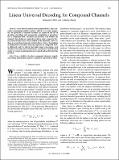Linear Universal Decoding for Compound Channels
Author(s)
Abbe, Emmanuel A.; Zheng, Lizhong
DownloadAbbe-2010-Linear Universal Dec.pdf (327.7Kb)
PUBLISHER_POLICY
Publisher Policy
Article is made available in accordance with the publisher's policy and may be subject to US copyright law. Please refer to the publisher's site for terms of use.
Terms of use
Metadata
Show full item recordAbstract
Over discrete memoryless channels (DMC), linear decoders (maximizing additive metrics) afford several nice properties. In particular, if suitable encoders are employed, the use of decoding algorithms with manageable complexities is permitted. For a compound DMC, decoders that perform well without the channel's knowledge are required in order to achieve capacity. Several such decoders have been studied in the literature, however, there is no such known decoder which is linear. Hence, the problem of finding linear decoders achieving capacity for compound DMC is addressed, and it is shown that under minor concessions, such decoders exist and can be constructed. A geometric method based on the very noisy transformation is developed and used to solve this problem.
Date issued
2010-11Department
Massachusetts Institute of Technology. Department of Electrical Engineering and Computer ScienceJournal
IEEE transactions on information theory
Publisher
Institute of Electrical and Electronics Engineers / IEEE Information Theory Society
Citation
Abbe, Emmanuel, and Lizhong Zheng. “Linear Universal Decoding for Compound Channels.” IEEE Transactions on Information Theory 56.12 (2010) : 5999-6013. Copyright © 2010, IEEE
Version: Final published version
ISSN
0018-9448